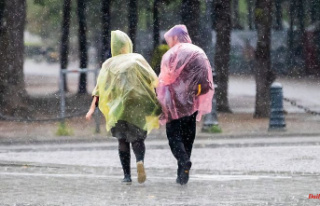When you think of the Oktoberfest, you have beer, dirndls and full platters of meat in mind. Whole oxen, hundreds of thousands of chickens and long sausages are simply part of it. It is all the more surprising that vegans are now also welcome at the Wiesn.
Vegetarian was yesterday. Now is vegan. Ironically, at the Wiesn, the festival of meat lust with chicken, knuckle and oxen, more and more vegan dishes are filling the menus. In the Schottenhamel tent, baked potato waffles with mushroom ragout and herbs are vegan, in the Paulaner tent there is vegan currywurst with a hot sauce, in the Armbrustschützen tent there are spicy seitan goulash and Bohemian stew on the menu. And landlady Antje Haberl from the Ochsenbraterei has brought the vegan star chef Sebastian Copien into the tent especially for the Wiesn.
Vegan food can be found in many tents. What was considered a concession to fringe groups almost ten years ago, especially at the Oktoberfest, is normal today. According to the Federal Ministry of Food and Agriculture, seven percent of Germans eat vegetarian and one percent vegan. Above all, however, the number of those who reduce meat consumption and also resort to vegan or vegetarian food is increasing. 44 percent already are.
"The demand for vegetarian options has been steadily increasing for many years, and a few years ago the vegan option started," says landlady Haberl. She has vegan patties (meatballs/meatballs/meatballs/meatballs) based on peas - analogous to the ox patties.
The Wiesn community is divided when it comes to the vegan Weißwurst, which is available in the Hofbräu tent, among other places. The cabaret artist Monika Gruber, invited to the test dinner with the Munich child Viktoria Ostler from the Bavarian Radio, was not very convinced. It looks "like pressed sawdust", the media quoted Gruber when looking at the white-yellowish sausage in BR. "I don't understand the approach. I mean, you don't order meaty kohlrabi either." Cabaret artist colleague Michael Mittermeier judges more forgivingly. "It's good that the diet is changing. Whether it's the vegan white sausage or a vegan "meat" patty, it's a gain," he says - and reveals himself to be a meat eater.
Former "Tagesschau" spokesman and RTL presenter Jan Hofer remains factual when asked how he finds vegan white sausages: "If you like it, you should eat it." Model Alessandra Meyer-Wölden thinks it's "really great" and comedian Oliver Pocher jokes: "I eat it all. But I wanted to eat a chicken like that. Because of all the antibiotics – and you can save yourself the flu shot."
Climate activists and animal rights activists have been protesting against the high meat consumption at the Wiesn for years. When the landlords moved in, a group also blocked the street in protest against animal suffering and the climate damage of "meat-centric cuisine". The activists called on the innkeepers to "remove all animal products from the menus".
The festival is far from that. Almost 435,000 chickens, around 66,400 knuckles of pork, 125 oxen and 30 calves were eaten by the guests at the last pre-pandemic Wiesn in 2019, essentially as much as ever. They also drank more than seven million liters of beer, which is correct from a vegan point of view: beer contains - at least according to the German Purity Law - nothing animal - even if it brings out the animal in some people in the right amount.
Overall, meat consumption in Germany is falling. According to the Federal Agency for Agriculture and Food, it fell from 61 kilograms per capita in 2018 to 55 kilograms in 2021. "A massive transformation process is taking place in our food system," says Anna-Lena Klapp from the nutrition organization ProVeg. "More and more people are recognizing the enormous problems that an animal-heavy diet causes: from climate change and environmental destruction to diseases of affluence and zoonotic pandemics to world hunger and animal suffering."
Nine years ago, two Wiesn hosts offered vegan dishes at the folk festival for the first time. There was vegan organic fricassee in the Ammer duck and chicken roastery, and soy medallions in cream sauce and vegan cheese spaetzle were served in what was then the Herzkasperl tent at the Oidn Wiesn. However, each without cheese, cream or chicken. The spokesman for the Wiesn hosts at the time, Toni Roiderer, who came from a family of butchers, did not necessarily see a need for extra vegan dishes at the Oktoberfest at the time. "Beer, pretzels, radishes, radishes - that's wonderful." And he rebuked vegetarians who demonstrated against meat consumption at the Wiesn. "I don't get involved when the vegetarians eat the cattle's feed."












